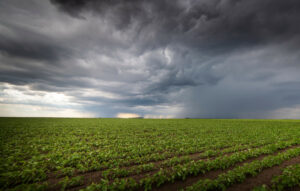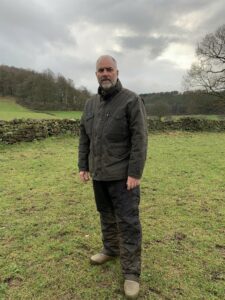UK-wide weather station network provides data to aid agronomic decision making
14th December 2022
Sencrop and Frontier Agriculture have joined forces to roll out a UK-wide network of connected weather stations, helping farmers and their agronomists to make better crop management decisions.

Following a recent trial, the organisations will install 480 weather stations on 240 sites, with each getting a rain and wind mast. “We’ve got about 300 out there so far,” says Dr Paul Fogg, crop production technical lead at Frontier.

Dr Paul Fogg
The collaborative network will be managed by Frontier, giving farmers access not only to their own data but also other Frontier-connected stations, helping to build a picture of developing weather and improving forecasting. “Agriculture is directly linked to the vagaries of the weather, and smart use of weather data to drive decision support tools will become increasingly important,” explains Dr Fogg. “Integrated pest management and evidence supported decisions will become a prerequisite for a ‘licence to operate’.
“Weather data will also help contextualise crop performance and inform future crop management decisions.”
That may be timing of crop protection sprays, fertiliser applications, irrigation scheduling, and other field work – farmers can better target their resources by having real-time weather information at their fingertips. In addition, contractors can identify the best locations to visit at any given time, minimising downtime and maximising productivity.
The data will also enable better disease modelling, helping farmers to proactively tackle barley yellow dwarf virus or blight, for example. Sencrop already has a blight monitoring feature in the app, as well as cercospora monitoring developed with BBRO, says Dr Fogg. “These tools provide earlier disease insight and that’s important for the farmers our agronomists advise. This new weather station initiative complements existing Frontier insight and the analytical tools provided via our online farm management platform, MyFarm.
“Earlier insight means our agronomists can help farmers improve the quality of decisions in relation to disease intervention.”
In the app, farmers can view real-time data for up to 40 different in-field locations in their area, and can integrate all the information with their farm management software for environmental stewardship purposes. “The app is very intuitive and the subscription package is competitively priced,” adds Dr Fogg.
The weather stations themselves are supplied free of charge to help grow the network. Moreover, anyone with Sencrop stations already installed in their land are also able to join the Frontier network. “We now have nearly 2,000 stations installed across the UK,” says Martin Ducroquet, co-founder of Sencrop. “And globally, there are more than 25,000 connected. The more data generated and shared, the more powerful the tool becomes.”
The app also offers a range of forecasting providers (up to seven available) to enable comparison of all forecasting models in one place. It looks at the accuracy of their forecasts based on historic information. “Agronomists can use this to give more informed and timely advice,” says Dr Fogg. “And it can also help us to understand how harvest is developing, so we can manage grain movements and predict demand for driers.”
The UK is a key agricultural country and Frontier is at the forefront of precision farming, adds Mr Ducroquet. “With Frontier, we share the same view of how key local and collaborative data will foster precision farming and enable the company to build a strong services strategy to better advise its growers.
“Thanks to our leading micro-climate platform, we want to empower Frontier’s agronomists and farming customers to make better decisions and reduce crop risks, with a positive agro-environmental footprint.”
For more information visit www.sencrop.com and/or www.frontierag.co.uk.
